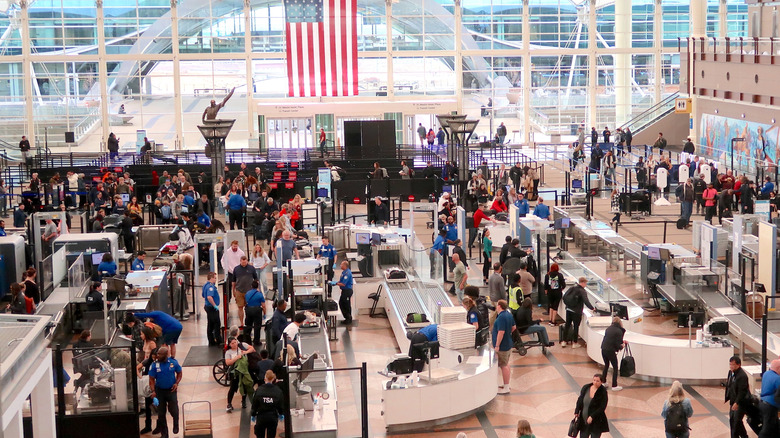The Common Activity That Can Be A Red Flag For TSA Agents
Let's be honest: Dealing with the TSA is one of those unavoidable procedures that can put any traveler on edge. From removing your shoes to emptying your pockets, pulling out all of your electronics, and going through scanners, a bad TSA experience can easily put a damper on the start of any trip, ultimately setting a less-than-ideal tone for the beginning of that much-awaited vacation you've been dreaming of for months. Thankfully, though, not all TSA encounters need to be stressful, and there are ways to get through airport security without getting flagged. It just takes a little planning and awareness to make the TSA experience smoother — and knowing what behaviors might attract unwanted attention from TSA agents is a crucial first step.
As a general rule, one of the first things TSA agents immediately notice about you is whether you're trying to avoid attention — and something as simple as using your phone is typically a tell-tale sign that something might be amiss. As a result, this seemingly innocent behavior can potentially lead to getting flagged by an agent, which can then lead to an additional airport screening procedure where you'll typically be pulled aside and patted down.
Acting distracted can draw more TSA attention
When going through airport security, TSA agents are trained to spot travelers who appear to be avoiding interaction. A few common signs of this include darting eyes, excessive fidgeting, or deliberately avoiding eye contact by, for example, scrolling through your phone. And while some of these behaviors might stem from natural travel or airport anxiety, security agents might view them as potential indicators that a passenger has something to hide. Even unconscious signs of nervousness like throat clearing, heavy breathing, or stammering can trigger increased scrutiny.
That said, using your phone while going through security checkpoints creates another layer of concern for TSA agents. After all, when you're focused on your screen or engaged in a phone conversation, you're more likely to miss important instructions about removing items from your pockets or placing electronics in separate bins. These preventable mistakes don't just slow down the line — they often result in additional screening, as agents must ensure the oversight wasn't intentional.

